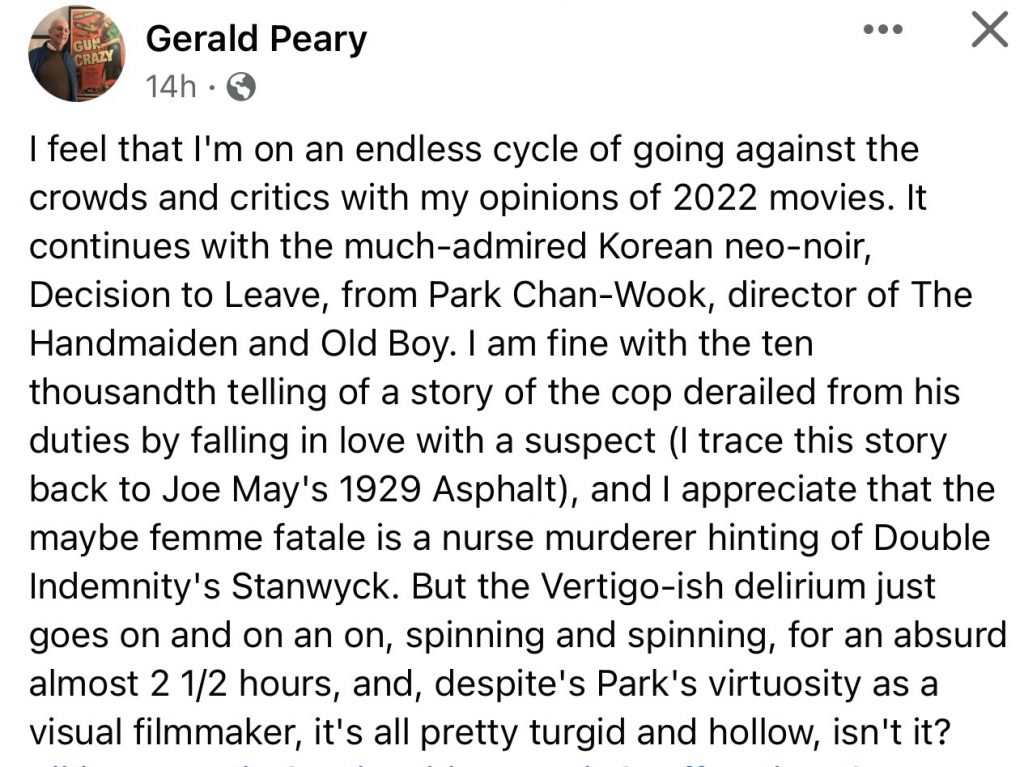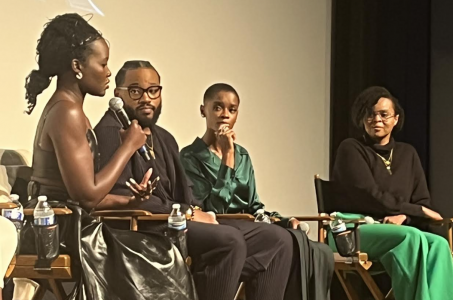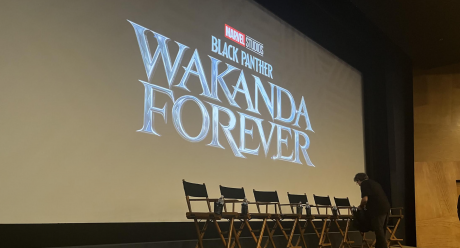A quick thought on the Pelosi assassination attempt. pic.twitter.com/unvJoFMfYm
— Rick Wilson (@TheRickWilson) October 30, 2022
A quick thought on the Pelosi assassination attempt. pic.twitter.com/unvJoFMfYm
— Rick Wilson (@TheRickWilson) October 30, 2022
Regional friendo: “Edward Berger‘s All Quiet on the Western Front popped on Netflix two days ago. I’m wondering what your reaction is.
“I watched it last night. Very brutal but exquisitely well made. But what really interested me was the material that was inserted that was not in the book:
“One, the armistice negotiations, showing the French need for vengeance, which would show up in the disastrous Versailles treaty that sowed the seeds for WW2.
“Two, German militarism and nationalism in the form of the obstinate general who decides to mount an offensive just before the armistice goes into effect.
“And three, Paul Baumer (Felix Kammerer) dying just minutes before the armistice. In the book he dies in October, weeks before the end of the war. But having him die on Nov. 11 was, I think, a good move, making the futility of this most futile of wars even more damning and personal.
“A very, very good film. I’m wondering if it will make the final five for the foreign language Oscar.”
HE to regional friendo: “I actually saw it yesterday afternoon. I’d been told that seeing it on a big screen was essential, so my son Dylan and I saw it at the IFC Center. The theatre was the size of a modest living room, if that, and the screen was maybe 80 inches wide. I felt infuriated, rooked.
“I was thinking the same thing about the punish-the-Germans element in the Versailles Treaty, and how this set the stage for German fascism and World War II. Horror begets horror.
“But apart from the fact that Germany has finally made its own version of Erich Maria Remarque’s 1929 novel, and despite it feeling bracingly authentic and horrific and having been vigorously produced and Paths of Glory-ed to an nth degree, we’ve all seen these ‘war is hell’ meets ‘lambs to the slaughter’ films before. Many times before.
“I respect and admire AQOTWF for what it is and what it’s worth. But in our current realm this kind of large-sprawling-canvas, chaos-and-brutality-of-war film can only sink in so far. And 147 minutes felt too long. 120 or 125 would have sufficed.
“Haunting, brutally beautiful images start to finish. But what was up with the family of foxes at the beginning? Why didn’t Berger show us dead foxes near the end?
And that farmer’s kid shooting Kat (Albrecht Schuch) over stolen eggs and an attempted theft of a goose? It would have been better if the kid and Kat had shot each other. I wanted that kid dead.
“They should have changed one thing. When the bald German general (Devid Striesow) orders his exhausted, shell-shocked ghost troops to go back into battle one last time before the 11 am armistice, the troops should have revolted and fragged him. They should stormed his stronghold and beaten that fucker to death with their rifle butts (like the Russian general who’s killed by the troops in Doctor Zhivago). That would been profoundly satisfying.
“When Remarque’s book was published in ‘29 and Lewis Milestone’s film version appeared in ‘30, it was fresh impressionism and a horrifying carnage. But 90 years later and after many such films have covered similar ground (two previous film versions, 65 years after Paths of Glory, and only three years after Sam Mendes’ 1917) it almost feels like an afterthought. A jarring and penetrating one, but recycled material all the same.
“Should it be Oscar-nommed for a Best Int’l Feature Oscar? Yes, it should be.”
“Or why I’m standing here trying to answer your bullshit questions. I guess it means that I lack the character to say no. But fuck it…I’ll answer a few of these stupid questions and then I’m outta here. What else?”
Actual Lancaster quote: “I don’t know why we’re carrying on this nonsense ”
Roughly 35 minutes into Tar Cate Blanchett‘s Lydia Tar sardonically describes herself as a “U-Haul lesbian.” I chuckled when I heard it despite not knowing what it meant. Please forgive my deplorable ignorance.
The term stems from the bonding nature of lesbians, who, unlike significant numbers of gay guys, don’t tend to fuck like rabbits. Lesbians tend to have about the same number of sexual partners as heterosexual women, which is relatively few.
Boomer women have had an average of 7.4 partners, while boomer males have enjoyed 12.9. GenX asnd Millennial omen have averaged about 10 lovers.
Lesbians, in short, are like other women in craving the security of a relationship; they may even be more anxious to be in a relationship than straight women. Hence this Urban Dictionary definition:

This happened this morning at a Re-Elect Gretchen Whitmer rally in Michigan. Challenged by a rightwing heckler, Barack Obama was his usual eloquent, impassioned and disciplined self. But check out Ms. Yellowhair with the black-rimmed glasses behind Barack. (His right, our left). Will you look at her? She’s half-listening at best. She’s yappity-yapping while he’s talking and talking with her friends. She mostly seems focused on the video she’s taking and what her friends think of it and yaddah-yaddah. This is distraction. This is iPhone culture. This is America.
“Who died and made you the great pumpkin? Please put drugs in my candy, and no Elvis costumes.”
“This is the life philosophy of Zillennials. Things that are interesting might also contain something that could cause a moment of discomfort so ban it all. It’s not your fault, kids. Your parents ruined you by over-protecting you, and now you’re these assholes.”

“Doomstruck,” posted on 10.5.22.
Last night I bought the new “Revolver” remix, but only the album itself and not the expanded outtake version that cost $34 or thereabouts.
I’m saying again that a significant reason for the Beatles’ success was the fact that three of them were exceptionally good looking. If the Beatles had been burdened with homely faces (i.e., if they had looked like two or three of the dorks in The Association) their trajectory might have been quite different.
Is the ’22 Revolver remix a cash grab? Of course it is, but it’s also the first using a digital technology (developed by Peter Jackson’s team) that allowed Giles Martin to break it all down, instrument for instrument, and remix or even reconstitute the original songs. I can really hear and even feel the enhancements.
My Policeman (Amazon Prime, 11.4) is a tepid and morose gay tragedy, set in late 1950s England. And Harry Styles‘ rote performance as Tom Burgess, a sexually repressed gay policeman, is not a burnisher. Ditto David Dawson‘s as Patrick Hazlewood, a museum curator who becomes Tom’s lover and a rival for his affections in the matter of Emma Corrin‘s prim and proper Marion, who Tom marries because he needs a beard, which is a shitty thing to do.
But Marion evens the score down the road. Shittily, I mean.
Give Styles credit for bravely and energetically committing to some fairly graphic sex scenes with Hazlewood (kiss-slurping, panting, blowing, ass-fucking) but as I said in an earlier post, Styles is hot but Hazlewood isn’t, or at least not hot enough for me.
There are some pretty guys whom straight guys can at least imagine having some kind of vague intimate contact with. Mick Jagger in Performance was one. In True Romance Christian Slater‘s Clarence Worley says that he could’ve fucked the young Elvis Presley. But one look at Hazlewood and I went “nope.” Cold eyes, dorky haircut, emotionally needy and greedy.
I had a good laugh, however, when Dawson/Hazlewood hooks up with some anonymous guy and they decide to get down in an alleyway. They’re busted by a pair of bobbies before anything happens, but just before Dawson is about to drop to his knees the recipient drops a magazine on the damp pavement so Dawson won’t chafe his knees and his trousers won’t get wet. Thoughtful.
To be perfectly honest, My Policeman struck me as a stacked deck — basically a gay agenda film by way of an indictment of straight British society and the cruel repressions of the immediate post-war era.
It basically says that while being gay in 1957 Brighton was often a lonely and miserable thing, it was infinitely preferable to holding down a dull civil service job (Styles is a bobbie) while enduring a dull and regimented married life with a woman you don’t love and don’t really want to fuck either (the sex scenes between Styles and Corrin are grim and sad). And it absolutely revels in the joys of gay sex, over and over. Oh, the rapture, the ecstasy and the muscle tone!
It’s based on a year-old, same-titled book by Bethan Roberts. The Amazon copy reports that Roberts “reimagined the real-life relationship that the novelist E. M. Forster had with a policeman, Bob Buckingham, and his wife.”
Well, if it was good enough for Forster…
I was ready and willing to be engaged and transported, but less than five minutes in I was muttering “oh, shit” to myself. I knew this ploddingly pedestrian, dull-as-dishwater drama would be trouble during the opening credits, in fact. I can always smell trouble coming ‘round the bend.
While most of My Policeman is set in ’57 and ’58, about 35% or 40% is set in the late ’90s when Styles, Dawson and Corrin’s characters are in their mid to late 60s. They’re played, respectively, by Linus Roche, Rupert Everett and Gina McKee.
Honestly? McKee, who plays the least obliging and most clueless character, struck me as the most appealing. Her manner is gentle, her eyes are kind and she has a nice smile. Plus she doesn’t push it.
I was sitting in the third row in a nearly vacant theatre (two older women were sitting 10 or 12 rows behind me), and so I decided to keep my phone on and text my reactions to a friend as the film went along. Just watching it would have been unbearable. I had to fight back with my fingers and thoughts. Here are some of them:
“Watching Policeman. Totally tepid.
“The older guy who’s had the stroke (Everett) doesn’t look like either Styles or Dawson so who is he? Okay, fuck it — I’ll look it up on Wikipedia.
And an industry friendo agrees with Scott Mantz: “First half lame. Second half launches.”


The title alone, Savage Salvation**, tells you everything. The fact that problematic producer Randall Emmett directed is a problem upon a problem.
Previously titled Wash Me In The River.